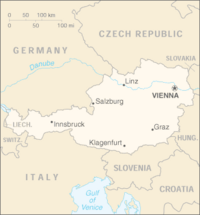Welcome to the Virtual Education Wiki ~ Open Education Wiki
Austria: Difference between revisions
(→Matura) |
|||
| Line 57: | Line 57: | ||
* Fachhochschulen (universities of applied sciences); | * Fachhochschulen (universities of applied sciences); | ||
* Pädagogische Hochschulen (university colleges of teacher education). | * Pädagogische Hochschulen (university colleges of teacher education). | ||
Revision as of 08:44, 14 July 2011
by authorname authorsurname
Experts situated in Country
Country in a nutshell
Austria (German: Österreich), officially the Republic of Austria (German: Republik Österreich), is a landlocked country in Central Europe. It borders both Germany and the Czech Republic to the north, Slovakia and Hungary to the east, Slovenia and Italy to the south, and Switzerland and Liechtenstein to the west. The capital is the city of Vienna on the Danube River.
The origins of modern Austria date back to the ninth century, when the territory of Upper and Lower Austria became increasingly populated. The name "Ostarrichi" is first documented in an official document from 996. Since then this word has developed into the Österreich.
Austria is a parliamentary representative democracy comprising nine federal states and is one of six European countries that have declared permanent neutrality and one of the few countries that includes the concept of everlasting neutrality in its constitution. Austria has been a member of the United Nations since 1955 and joined the European Union in 1995.
Education in Country
The Republic of Austria has a free and public school system, and nine years of education are mandatory. Schools offer a series of vocational-technical and university preparatory tracks involving one to four additional years of education beyond the minimum mandatory level. The legal basis for primary and secondary education in Austria is the School Act of 1962. The federal Ministry of Education is responsible for funding and supervising primary, secondary, and, since 2000, also tertiary education. Primary and secondary education is administered on the state level by the authorities of the respective states.
Kindergarten (nursery school) is the traditional form of pre-primary education for children aged three to six in Austria. However, it does not form part of the school system. Kindergarten is optional and children attend at their parents’ initiative.
Compulsory schooling in Austria lasts nine years. It extends to all children permanently residing in Austria regardless of their nationality.
The Volksschule (Grundschule or primary school) is charged with imparting basic education for all.The social integration of children with disabilities is to be taken into account.
The Sonderschule (special school) may be attended during the entire period of compulsory schooling (age 6 to 15) and consists of levels I and II, as well as an upper-cycle form. Pupils/students with special educational needs may be educated either in a special school geared to their disablement or in inclusive classes at primary schools, Hauptschule (general secondary school) or the lower cycle of Allgemeinbildende höhere Schule (academic secondary school).
In secondary stage I (years 5 to 8) a first differentiation takes place at the organisational level comprising the following school types:
- Hauptschule (general secondary school);
- Neue Mittelschule (new secondary school, pilot schools);
- Allgemeinbildende höhere Schule (academic secondary school, lower cycle).
In secondary stage II (years 9 to 13) a further differentiation takes place depending on students’ talents and interests:
- Polytechnische Schule (pre-vocational school; is used as ninth school year by those students aged 14-15 who aim to enter working life as soon as they have completed compulsory schooling);
- Berufsschule (part-time compulsory vocational school, years 10 to 13 at maximum) – parallel to in-company vocational training ('dual system'). A requirement for starting apprenticeship training is completion of nine years of compulsory schooling; apprentices are at least 15 years old;
- Berufsbildende mittlere Schulen (medium level technical and vocational schools, years 9 to 12 at maximum);
- Berufsbildende höhere Schulen (higher level technical and vocational schools, years 9 to 13);
- Oberstufe der Allgemeinbildenden höheren Schule (academic secondary school, upper cycle, years 9 to 12).
In addition to the eight-year type of academic secondary school, there is the Oberstufenrealgymnasium, which is a separate type of upper level academic secondary school (years 9 to 12; entered on completion of eight years of general education).
- Bildungsanstalten für Sozialpädagogik and Bildungsanstalten für Kindergartenpädagogik (training schools for educators and for kindergarten teachers, years 9 to 13);
- Schools and other training programmes for health professions.
In the tertiary sector there are the following training institutions:
- Medizinisch-technische Akademien (paramedical college) and Hebammenakademien (midwifery college) (Full-time training at one of these colleges lasts three years). Since 2006, some Fachhochschulen (universities of applied sciences) have provided bachelor’s degree programmes for paramedic practice and midwifery;
- Universities and accredited private universities;
- Fachhochschulen (universities of applied sciences);
- Pädagogische Hochschulen (university colleges of teacher education).

